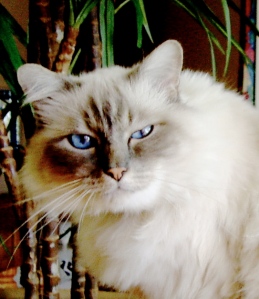I recently perused a website devoted to plucking deserving old words from the jaws of oblivion (Word Warriors). You can also nominate a word you like, say why, and other users can give it the thumbs up or down. With some luck, your favorite word will make it onto their word list.
Among their top ten words for 2012 is supercilious, which surprised me, as I didn’t realize it had gone out of fashion. I use it all the time. But perhaps that’s because my choice of vocab. can be somewhat antediluvian (another gem on their list). They also list transmogrify, which has a distinct Harry Potteresque quality, and which, if you’re British or Australian, reminds you of cats (moggie = ordinary, non-pedigree cat).
Speaking of cats, I was delighted to find concatenation on their list. This is a word that is hard to forget once you have read an account of Bertram Wooster conversing with his butler Jeeves, with Wooster grappling, as usual, for the m ot juste:
ot juste:
“And owing to…what’s that something of circumstances you hear people talking about? Cats enter into it, if I remember rightly.”
“Would concatenation be the word for which you are groping?”
(“Jeeves and the Greasy Bird”)
In case you’re wondering, concatenation has nothing to do with cats and everything to do with linking things together, as in a chain of events. Too bad – cats would be infinitely more entertaining.
There are a lot of old-fashioned words that appeal to me. Such as flibbertigibbet. I like it because it’s fun to say and because P. G. Wodehouse used it to describe one of his flighty young female characters (although I can’t for the life of me remember which one, and I’m not about to dive into the Master’s opus—after all, there is a considerable number of volumes to plow through).
For some reason, to me the word flibbertigibbet conjures up an image of colorful butterflies flitting hither and thither. Plus, it is usually applied, often in an indulgent way, to chatty and somewhat scatterbrained young women, so I assumed that the origin of flibbertigibbet was something sweet, even innocent.
Far from it. To my horror, Wikipedia—the Internet’s reigning fount of wisdom—has something quite different to report: one possible origin relates to birds flying by and pecking the remains of executed criminals set out for display on a platform or gallows (a gibbet). Yuck! And it gets worse. Well, actually, it doesn’t, but it’s just as bad: in naval terminology, a gibbet is
A wooden frame from which dead pirates are hung, often in a metal cage especially fitted for the dead man. This is done as a warning to others who would think of taking up a career in piracy. (see here)
An alternative explanation offered is more benign and refers to the jib sail that may flutter in the wind, depending on how tightly it is rigged. Better, but not great. And nothing at all to do with butterflies.
Whatever its origin, flibbertigibbet has an illustrious lineage: Shakespeare used it in King Lear. Alas, butterflies were far from his mind:
This is the foul fiend Flibbertigibbet. He begins at curfew,
and walks till the first cock. He gives the web and the pin,
squints the eye, and makes the harelip; mildews the white wheat,
and hurts the poor creature of earth.
(Act III, Scene 4)
Flibbertigibbet: a foul fiend? This is definitely a far cry from the contemporary use of the word, which is perhaps not terribly complimentary, but at least a flibbertigibbet is harmless.
But perhaps all these attempts at delving into the supposed etymological roots of the word are misguided, and flibbertigibbet is simply one of those words that attempts to sound like the thing it describes. Think barnyard words like moo, oink, and woof. This, indeed, is the explanation offered by Evan Morris (whose excellent site The Word Detective I have just discovered):
“Flibbertigibbet” almost certainly arose as an attempt to duplicate the sound of someone babbling or prattling on in meaningless chatter.
Yes! Onomatopoeia to the rescue! This is now my preferred explanation, as I am not partial to the idea of birds pecking at a person’s exposed remains . . . which brings to mind the unfortunate Prometheus of Greek mythology, who had to undergo the indignity of having his liver pecked out daily by an eagle. Fortunately, his liver was self-regenerating, much like a gecko’s tail, so there’s your silver lining. Such as it is.
